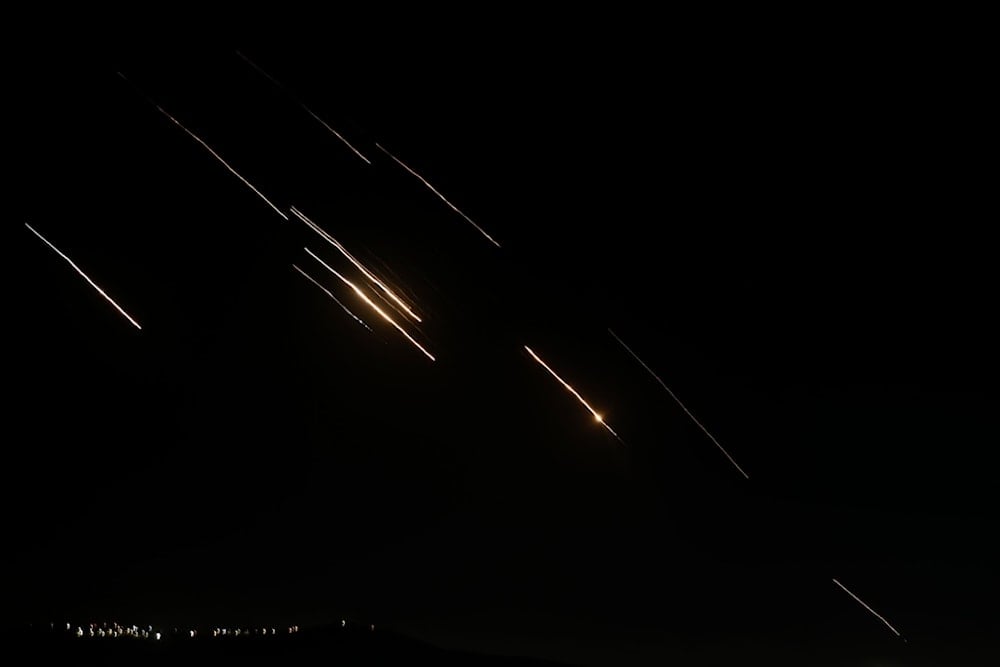Iran says capabilities high, discusses Israeli use of Iraqi airspace
Iran warns the Israeli occupation that its capabilities allow it to conduct dozens of retaliatory operations similar to True Promise.
-

Missiles launched from Iran towards occupied Palestine are seen in the West Bank city of Nablus on October 1, 2024. (AP)
Iran can conduct dozens of retaliatory operations like Operation True Promise, Defense Minister Brigadier General Aziz Nasirzadeh affirmed, stressing that Iran's defense capabilities remain high, as quoted by Ebrahim Rezaei, the Parliament’s Committee on National Security and Foreign Policy's spokesperson.
Detailing the success of Operation True Promise 2 on October 1st, Rezaei confirmed that 90% of Iran's projectiles and missiles successfully hit their targets, contrary to what "Israel" claimed amid the imposition of tight media censorships to conceal its security and defensive failure.
Additionally, Nasirzadeh discussed the Israeli aggression on Iran last week, reiterating that the objective failed and very little damage was inflicted on the Islamic Republic's missile and defense system manufacturing cycle, with all damages being immediately repaired.
He further stated that "the Zionist enemy attempted to harm Iranian air defense systems but failed to achieve any significant success," adding that "there is no issue with the missile production process."
In this context, he said, "Even a single bullet fired by the Zionist entity against barren land in Iran is considered an affront to our strong and ancient country, and we will not allow it; we will respond," reiterating Iran's legitimate right to respond to any aggression against its sovereignty.
The Iranian defense minister mentioned that after Operation True Promise 2, footage and satellite images of the targeted locations were exposed to everyone, noting that Iran will further respond to Zionist aggression as per international law.
He also dubbed the Israeli entity's claim of its destruction of Iran's defensive capabilities "nothing but a trivial claim."
'Israel', allies, use Iraqi airspace ahead of attack
Tuesday's session also discussed the Israeli use of Jordanian and Iraqi airspace to launch its attack on Iran. In this context, Rear Admiral Habibollah Sayyari, deputy chief of the Iranian Army for Coordination, revealed that Israeli, American, French, and UK warplanes hovered in Iraqi airspace for 25 days before the aggression on Iran.
After Operation True Promise 2, Sayyari noted that Iraqi airspace was "at the disposal" of the Israeli regime and its Western allies, as well as some Persian Gulf countries, featuring hundreds of manned and unmanned warplanes, tanker aircraft, and electronic warfare aircraft ahead of the attack.
“However, as a result of the readiness and alertness of our dear [servicemen] in the Air Defense and Air Force, a concerted operation took place that did not allow any of the enemy’s advanced aircraft to cross our borders,” he said.
Sayyari stated that the operation compelled enemy warplanes to launch ballistic missiles at the Islamic Republic from as far as 100 kilometers beyond its borders. He noted that many of these projectiles were intercepted by Iranian air defenses, although a few did manage to hit targets within the country.
Iranian Foreign Minister Abbas Araghchi stated that Iraqi officials confirmed they would not allow their airspace to be used against Iran during his previous visit to Iraq.
Araghchi added that "Iraq will file an international complaint regarding this matter," adding that Israeli fighter jets utilized Iraqi airspace under US control, which would be legally challenged by Iran.
He also stated that "Israeli fighter jets have also used the airspace of other countries, and we are in contact with them and are monitoring the situation."
Iraqi Hezbollah: US to pay price for using Iraqi space to attack Iran
The Iraqi Hezbollah Brigades condemned the Israeli attack on Iran, calling it a "dangerous precedent" and pointing out "several dangerous factors that must be addressed."
The Brigades pointed to several dangerous factors that must be addressed, the most important of which is "the use of Iraqi airspace to launch strikes on Iranian facilities, which were repeated in waves that lasted for hours."
The Islamic Resistance in Iraq - Hezbollah Brigades considered the assault "a dangerous precedent that Iran has not faced before," adding that "there is evidence indicating the use of Jordanian territory and the deserts of Hijaz as an air corridor," which "could not have happened without a prior agreement and premeditation by the Americans who dominate the Iraqi skies."
Moreover, the brigades condemned the aggression against Iran carried out by "a rogue entity that is reckless and foreign to the region, which constitutes a blatant violation and a serious transgression that must not go unpunished under any circumstances," warning that if it does go unchallenged, "it will become permissible, and this rabid enemy will repeat it."
The group held the United States responsible for its recklessness in using Iraqi airspace, threatening that "it will pay the price for that," affirming that "this will be, with God's assistance, at its [rightful] timing and place, and the Zionists are not exempt from it."

 5 Min Read
5 Min Read








